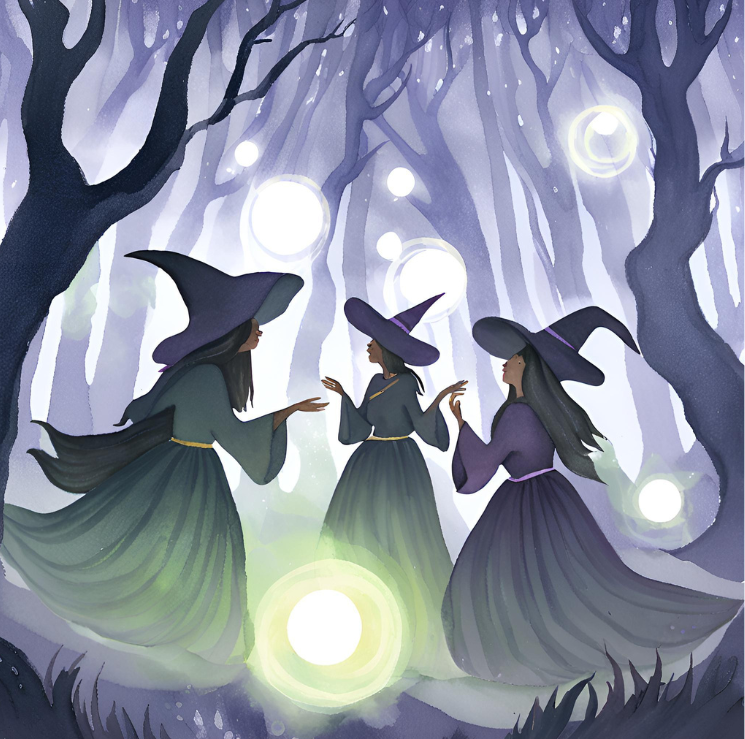1. Quick Introduction
“Fair is foul, and foul is fair.” Right from this intriguing line in Act 1, Shakespeare’s Macbeth plunges you into a gripping world filled with ambition, betrayal, and eerie supernatural elements. Written shortly after the infamous Gunpowder Plot of 1605—a failed attempt by a group of Catholics to assassinate King James VI of Scotland and I of England—Macbeth debuted in 1606. Although King James himself isn’t directly depicted, Shakespeare cleverly flatters him by portraying Banquo, an honorable ancestor of James, in a positive light. James’s fascination with witchcraft and his active role in witch hunts also inspired Shakespeare’s spooky witches. So, why read this classic? Because Macbeth masterfully illustrates how the thirst for power can twist even noble hearts, leaving readers with timeless insights into ambition, morality, and the darker sides of human nature.
2. Plot Summary
Macbeth, a respected Scottish general, encounters three witches who foresee that he will become king. When Macbeth was confirmed to be the Thane of Cawdor. Excited by their prophecy and encouraged by his ambitious wife, Lady Macbeth, he murders King Duncan to claim the throne. Once crowned, Macbeth struggles with guilt and paranoia, spiraling into a series of ruthless actions, including the murder of his trusted friend Banquo. His violent reign stirs rebellion, as Duncan’s son Malcolm teams up with English forces to reclaim the throne. Meanwhile, guilt-ridden Lady Macbeth descends into madness, and Macbeth, increasingly isolated and tormented by fear, faces his inevitable downfall as the witches’ prophecies come true in unexpected ways.
At its heart, Macbeth is about the dangerous consequences of uncontrolled ambition and moral decay. Macbeth’s relentless pursuit of power leads him from a respected hero to a despised tyrant, illustrating how ambition unchecked by morality can destroy both individuals and their communities.
3. Key Characters
Macbeth

Macbeth begins his journey as a celebrated warrior, widely admired for his courage and bravery in battle. Yet beneath this heroic exterior lies an ambition that soon spirals out of control. Driven by a hunger for power, Macbeth swiftly abandons his morals, committing murder and plunging Scotland into chaos. His internal struggles make him fascinating—combining raw ambition, deep insecurity, and overwhelming guilt. These layers of complexity transform Macbeth from an honorable hero into a tragic villain, someone readers simultaneously loathe and pity.
Lady Macbeth

Lady Macbeth, Macbeth’s fiercely ambitious partner, is equally captivating. She initially appears even more determined and ruthless than her husband, masterminding the plot to kill King Duncan. With chilling precision, she manipulates Macbeth into executing the deed, believing herself immune to remorse. However, as the story progresses, her guilt catches up to her, leading to hallucinations, sleepwalking, and ultimately madness. Lady Macbeth’s dramatic shift from strength to vulnerability highlights the psychological toll of unchecked ambition and deep-seated guilt.
Banquo

Banquo acts as a moral counterpoint to Macbeth. Noble, loyal, and honorable, Banquo remains steadfast in his integrity even when faced with temptation. The witches’ prophecy foretells that Banquo’s descendants will inherit the throne, a subtle nod from Shakespeare to King James, who claimed lineage from Banquo himself. Banquo’s unwavering morality sharply contrasts with Macbeth’s treachery and paranoia, emphasizing the destructive consequences of Macbeth’s choices.
The Three Witches

The Three Witches add a thrilling supernatural twist to the play. Their cryptic prophecies blur the lines between destiny and personal choice, leaving readers to wonder how much control Macbeth truly has over his fate. These eerie figures heighten the suspense and drama, reminding us that our destinies might not be entirely within our control.
Macduff

Macduff emerges as Macbeth’s courageous adversary. A noble figure embodying justice and honor, Macduff symbolizes righteous rebellion against tyranny. His character vividly contrasts with Macbeth’s cruelty and oppressive rule, representing hope and moral clarity in a story otherwise overshadowed by darkness.
Central to the story is the increasingly strained relationship between Macbeth and Lady Macbeth. Initially united by their ambitious plans, their partnership dissolves into isolation and madness as guilt consumes them. This unraveling vividly illustrates how unchecked ambition, even when shared, ultimately leads to tragic loneliness and despair.
4. What to Look For While Reading
As you dive into Macbeth, keep an eye out for some powerful themes, clever storytelling techniques, and meaningful symbols. Shakespeare didn’t just write a creepy tale about witches and murder—he created a deep, emotional journey that explores human nature, ambition, and the consequences of our choices.
Themes
Ambition and Power:
Pay close attention to how ambition slowly takes control of Macbeth and Lady Macbeth. At first, they seem almost normal—just a couple thinking big. But as they chase power without thinking about right and wrong, everything begins to fall apart. Their hunger for control becomes so intense that it blinds them to the damage they’re causing. Shakespeare seems to warn us: if you want power without having a moral compass, you’re headed for disaster.
Guilt and Conscience:
One of the most fascinating parts of this play is how guilt eats away at the characters. Macbeth and Lady Macbeth both do terrible things, but they handle their guilt very differently. Macbeth becomes paranoid and reckless, while Lady Macbeth, who once seemed so strong, slowly unravels under the weight of her conscience. Their minds become haunted—not just by ghosts, but by regret. Watching their psychological collapse is like watching a slow-motion train crash that you can’t look away from.
Fate vs. Free Will:
Here’s a big question: Is Macbeth doomed from the start, or does he dig his own grave? The witches make spooky predictions, sure, but does that mean his fate is sealed? Or is it his own bad decisions that push him over the edge? Shakespeare leaves enough mystery here for you to decide. Think of it like a puzzle: how much is destiny, and how much is just plain poor judgment?
Symbolism
Blood:
Get ready to see a lot of blood—real and imagined. Blood in Macbeth doesn’t just stand for violence; it’s a symbol of guilt that stains everything. Once Macbeth kills King Duncan, he starts seeing blood everywhere. Lady Macbeth, too, famously tries to wash invisible blood from her hands. Shakespeare uses blood to show that guilt can’t be scrubbed away, no matter how hard you try.
Darkness and Light:
Shakespeare plays a lot with darkness and light. Darkness often surrounds evil deeds, while light tries to break through as a symbol of truth, goodness, or innocence. But in Macbeth, those lines can blur. The story takes place mostly at night or in shadowy places, hinting at the confusion between right and wrong. It’s as if the darkness outside matches the darkness inside the characters.
Supernatural Elements:
From floating daggers to ghostly kings, this play is full of eerie moments. The witches—creepy and mysterious—start everything with their twisted prophecies. Ghosts pop up to remind Macbeth of his sins. These supernatural elements make it hard to tell what’s real and what’s just fear or madness. They also show how Macbeth’s mind is crumbling under pressure, blending imagination with terrifying reality.
Narrative Style
Dramatic Irony:
Shakespeare is a master of dramatic irony—when the audience knows something, the characters don’t. In Macbeth, you’ll often know that disaster is coming before Macbeth himself does. This creates tension and makes you want to yell, “No! Don’t do it!” But of course, he doesn’t listen. The irony makes the story more engaging, even a little frustrating in the best way.
Soliloquies:
Keep an ear out for Macbeth’s soliloquies—those deep, personal speeches where he talks to himself (and to us). They give us a peek into his heart and mind. Through these, we see his doubts, his guilt, his hopes, and his unraveling logic. These moments make Macbeth feel more human and tragic because we’re allowed inside his head as he slowly loses control of his life.
5. Takeaway Lessons
Out of all of Shakespeare’s plays, Macbeth is a top favorite for a reason—it’s dark, thrilling, and packed with big ideas that still matter today. One of the biggest lessons? Ambition is powerful, but without ethics to guide it, it can lead you straight into disaster.
Macbeth and Lady Macbeth let their hunger for the crown take over everything else. They didn’t just dream big—they acted on those dreams in the worst way possible: by murdering King Duncan and others who stood in their way. Now, you probably won’t go around plotting anyone’s death (I hope!), but the lesson still applies. Think about it: Have you ever been tempted to take credit for someone else’s work? Or maybe you’ve talked behind someone’s back just to make yourself look better? These might seem harmless at the moment, but chasing success by stepping on others often backfires. One way or another, those choices catch up with you.
In the end, Macbeth is more than just a spooky tragedy with witches and ghosts. It’s a serious warning: if you try to climb the ladder of success without a moral foundation, you might just lose your grip—and everything else along the way. Shakespeare shows us that power gained through lies, betrayal, or violence doesn’t bring happiness. It brings fear, loneliness, and regret. So, if you’re aiming high in life, make sure you’re also aiming to be kind, honest, and thoughtful because a clear conscience is worth more than any crown.
5.1 A little Something from the book
The play also got me thinking about how people in Shakespeare’s time understood mental health. Today, we talk about trauma, stress, and disorders with scientific language, but back then, things were very different. Lady Macbeth, for example, starts sleepwalking and sees imaginary blood on her hands. Her behavior suggests she’s suffering from intense guilt and trauma—but in the early 1600s, they didn’t have names like PTSD or anxiety. They believed strong emotions—like grief, fear, or guilt—could upset the balance of your mind or even be a punishment from God. It reminds me a bit of Ophelia in Hamlet, who breaks down after losing her father and being rejected by Hamlet. People back then understood that emotional pain could lead to madness, but they explained it in poetic, spiritual, or humoral (body fluid) terms instead of medical ones.
5.2 Discussion Points
- Could Macbeth have avoided his tragic fate, or was his downfall always inevitable due to his personality?
- Does Lady Macbeth deserve sympathy for her role in Macbeth’s actions, or should she be considered equally guilty?
6. Final Recommendation
Macbeth is perfect for anyone who enjoys deep psychological drama, complex characters, and timeless lessons about morality and ambition. Fans of Shakespearean tragedies or those exploring moral complexities will especially appreciate this gripping play. Dive into Macbeth to experience firsthand how Shakespeare vividly explores the dark side of human nature and ambition. Continue your journey with our other literary analyses for more insights into classic literature!